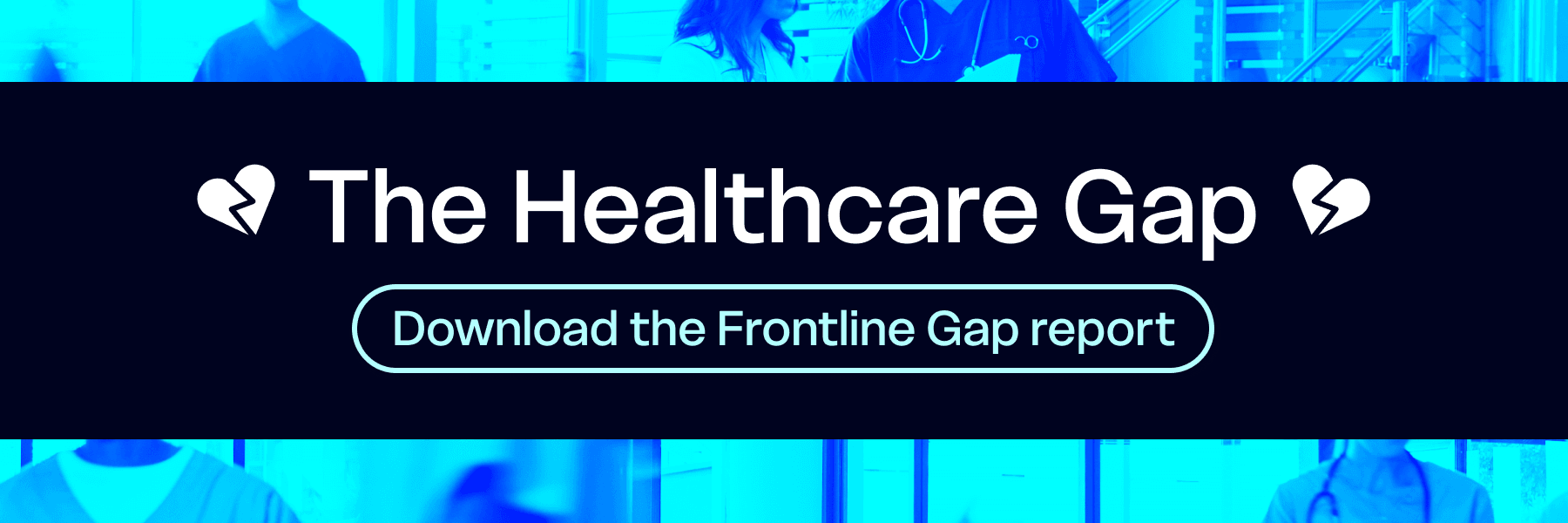Meet the frontline workers behind some of America’s most people-first cultures
Turning Caring Into Connection: How To Close the Frontline Gap in Healthcare


Barbara Booras
Head of Customer Community & CX Events at Workvivo
From providing routine care to responding to critical emergencies, frontline healthcare workers change – and save – lives every day. But despite their essential roles, many of these employees feel unrecognized, unappreciated, and undervalued.
That’s according to our recent Frontline Gap report, which surveyed over 7,500 frontline workers across industries, including over 690 in healthcare. We found that frontline healthcare workers are passionate about their jobs and values, but that inadequate tools, poor communication strategies, and lack of growth opportunities make them feel like their organizations care more about desk workers than them.
This can lead to major problems for your organization. If frontline healthcare workers feel disengaged, they’re four times more likely to quit their job, taking a wealth of experience and expertise with them.
To keep frontline healthcare workers happy and engaged, you need to close the frontline gap and ensure they feel as valued as they truly are. Read on for three key findings from our Healthcare Frontline Gap report, and download the full report to learn more.
1. Healthcare workers are value-oriented, but company missions aren’t connecting
While only one in five (21%) frontline workers across all industries say they “definitely” know what their company’s mission and values are, this rises to almost a third (30%) in healthcare.
Likewise, 26% of healthcare workers say they “definitely” care about their company’s mission and values, compared with the average of 19% across industries – coming in more than 10 percentage points higher than the lowest ranking industry, food and beverage (15%).
But interestingly, caring doesn’t correlate to connection. While healthcare leads the pack in knowledge, they’re roughly on par with average when it comes to actually feeling connected to their company’s mission and values. Indeed, when we zoom out, we see that healthcare’s connection levels are lower than those of other industries like aviation and energy and utilities.
This suggests that although healthcare workers are value-oriented, informed, and primed for engagement, company missions and values simply aren’t resonating with them, which may cause them to disconnect and feel detached from overall culture.
2. Irrelevant comms are wasting healthcare workers’ precious time
Frontline healthcare workers want to receive relevant updates from their CEO and understand company’s decisions better, but 45% say leadership is bad at communicating with them.
In fact, almost half (49%) of all frontline healthcare workers say that most of their organizations’ communications seem irrelevant to them. In other industries, this results in workers tuning out company comms, with almost one in five (19%) saying they “rarely or never” read them.
However, due to the critical nature of their work, healthcare workers don’t have the luxury of switching off from notifications. Healthcare remains the most likely industry to report they “frequently” read company comms (45%), but if the majority of these communications are irrelevant, they’re simply wasting healthcare workers’ valuable time.
At best, these lost minutes turn into lost hours, negatively affecting efficiency and productivity; at worst, alert fatigue could cause workers to miss information that’s actually important, potentially impacting patient care or compliance.
3. Frontline healthcare workers want to grow where they are
Healthcare is one of the most physically and emotionally demanding industries. Frontline workers must navigate high stress levels, exhaustion, and long working hours, all while delivering exceptional treatment to patients.
It can be challenging, but practitioners are drawn to healthcare because they want to make a difference. Perhaps it’s no surprise, then, that a whopping 58% of frontline healthcare workers say their favorite thing about their job is helping other people. When asked what they like most about their job, no other industry speaks as loudly or as unanimously.
What’s more, almost half (48%) of frontline healthcare employees wouldn't want a desk job if offered one – the highest among industries by far.
But organizations shouldn’t mistake this passion and devotion to their work for a willingness to stand still. Growth opportunities are still a significant priority for frontline healthcare workers, but only 14% are confident there’s a clear path forward at their current company, while 48% think they have fewer growth opportunities than office-based colleagues.
If your organization doesn’t provide these opportunities, you risk losing talented healthcare professionals to companies that do. Over half (53%) of frontline healthcare workers say they’d leave their current company for one that offers the same pay but better career growth.
To reduce attrition, organizations need to map out career paths that don’t end at desks, so healthcare workers can continue to do what they do best on the frontline.
Closing the frontline gap in healthcare
Frontline healthcare workers care deeply about their work, but poor communication tools and strategies prevent organizations from translating this into meaningful engagement.
With the right technology, you can bring your team together virtually, create a sense of belonging, and ensure that everyone feels connected, heard, and appreciated – wherever they are.
Want to get more insights about how the frontline gap is affecting healthcare workers, as well as actionable tips on how to address it? Download the full report to learn more.
